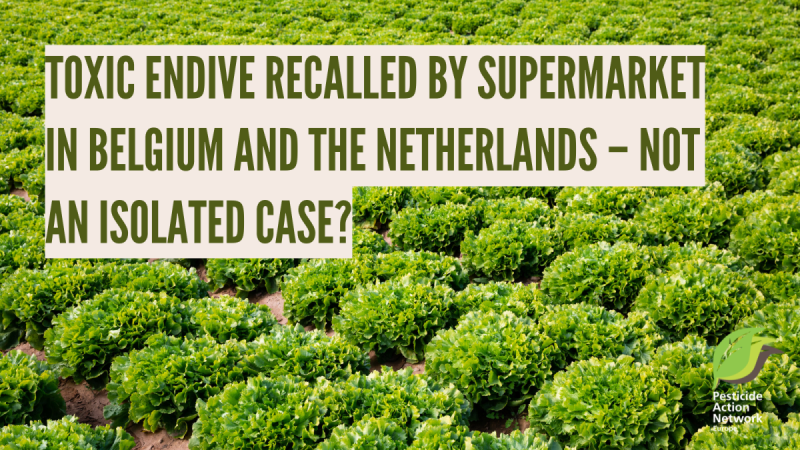Last week, supermarket chain Albert Heijn had to recall its endives due to excessive levels of the “forever chemical” pesticide tau-fluvalinate, which is toxic to bees and belongs to a group of pesticides that are neurotoxic. Just days earlier, the same company made headlines after its blueberries were found to be contaminated with hepatitis A, leading to several cases in Belgium and the Netherlands. The chain ensures these cases are “exceptional”. This might be the case for residues above the norm, but what are residues of this dangerous pesticide doing in our food anyway?
Belgian and Dutch food authorities and media published about the recall of 400 g plastic bags of Albert Heijn endive, sold between 12 and 18 January. The supermarket decided to withdraw the product in consultation with both the Belgian and Dutch food authorities and asked consumers not to eat it and to return it to the shop, where it will be reimbursed. The supermarket gave this explanation: ‘We understand that this recall may raise questions or concerns, especially after the recall of the “1kg bag of blueberries” earlier this week. At Albert Heijn, the safety of our products always comes first. We want to stress that these recalls are exceptional. They are designed to ensure the highest standards of food safety’.
However, ensuring food safety becomes challenging when dealing with pesticides. Tau-fluvalinate is an insecticide that belongs to the pyrethroid pesticides, which are neurotoxic and suggested to be endocrine disruptors. It is also a PFAS pesticide, a so-called “forever chemical,” which pose significant risks to both human health and the environment. This pesticide breaks down to the small, toxic and very persistent TFA, the small PFAS that pollutes our drinking water all over Europe. Tau-fluvalinate was first approved in 2011 for a period of 10 years, and without a new evaluation its approval has since been extended until January 2027.
PAN Europe has been actively advocating for a ban on PFAS pesticides. Our report last year, highlighted a troubling trend: European consumers' exposure to PFAS pesticides is on the rise. Between 2011 and 2021, the presence of these pesticides in fruits and vegetables tripled across Europe. And our reports on water show that the PFAS breakdown product TFA is extremely problematic all over Europe.
Incidents like the contamination of endives with pesticide residues above the legal norm can just as easily occur in other EU countries — including yours. Have you heard of any recent food recalls or public health problems in your country due to pesticide contamination? If so, we encourage you to share a link in your or any other language or your story with us at communications [at] pan-europe.info.
Read more:
